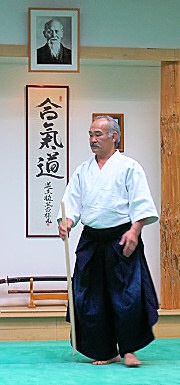T K Chiba Shihan
T K Chiba Shihan, 8th Dan Aikikai
Chiba Sensei was born in 1940 and began his Aikido training at the age of 18. He successfully petitioned to become an uchideshi or "live-in student" of Master Morihei Ueshiba. For seven years, he trained intensively under the master himself, and his son, Kisshomaru Ueshiba Doshu.
As part of the world-wide dissemination of Aikido, Chiba Sensei was assigned to Britain in 1966 to form the country's first national Aikido organisation, the Aikikai of Great Britain (later known as the British Aikido Federation). At first, Chiba Sensei established his headquarters in Sunderland, and then in London, naming his dojo Ten Pu Kan, "the House of the Heavenly Wind". Chiba Sensei spent ten years promoting the development of Aikido in Britain and many other countries throughout Europe. In 1970 he was promoted to 6th Dan and awarded the title of Shihan or "master instructor".
 Chiba Sensei returned to Japan in 1976. In 1981, on the invitation of the United States Aikido Federation (USAF), he moved to San Diego, California, to become Chief Instructor of San Diego Aikikai and Chairman of the Teaching Committee of the USAF Western Region. He was promoted to 8th Dan in 1994. In February 1995, a group of Chiba Sensei's students in the United Kingdom came together to form the British Aikikai with Chiba Sensei as its Technical Director. In 2001, Chiba Sensei created Birankai International to bring together all his students throughout the world under one umbrella, and to ease the financial burdens on Aikido students in poorer parts of the world. In 2006, the USAF Western Region became Birankai International North America.
Chiba Sensei returned to Japan in 1976. In 1981, on the invitation of the United States Aikido Federation (USAF), he moved to San Diego, California, to become Chief Instructor of San Diego Aikikai and Chairman of the Teaching Committee of the USAF Western Region. He was promoted to 8th Dan in 1994. In February 1995, a group of Chiba Sensei's students in the United Kingdom came together to form the British Aikikai with Chiba Sensei as its Technical Director. In 2001, Chiba Sensei created Birankai International to bring together all his students throughout the world under one umbrella, and to ease the financial burdens on Aikido students in poorer parts of the world. In 2006, the USAF Western Region became Birankai International North America.
Chiba Sensei strived to maintain a traditional outlook in his training by adhering to the teachings of O-Sensei and the historical Japanese philosophical traditions of personal struggle as a way of self-improvement:
"I try to stick to the traditional ways as much as possible. The martial, warrior spirit is something I admire greatly and is something I try to preserve. The combatative arts have a profound body history in them and I don't want to lose it. But it's more than that. We follow the art, which is struggle. And through the struggle, we transcend into the path of Aikido. Eventually, it brings harmony between you and the external world."